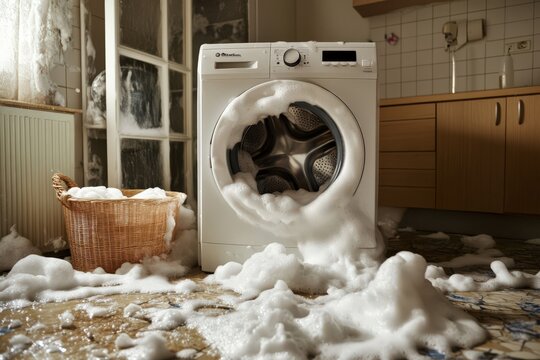Your washing machine is a reliable workhorse, but it can also be a potential source of significant water damage if not properly maintained. A leak from a washer can quickly lead to flooding, water damage to your floors, walls, and even your home’s foundation. At Okhchu Appliance Repair, we see firsthand how neglected washing machines can lead to costly repairs and devastating water damage. Here’s everything you need to know about washer leaks and how to prevent them.
Why Does a Washer Leak?
Washing machine leaks can occur for several reasons. Some of the most common causes include:
- Worn or Damaged Hoses: Over time, the hoses that connect your washing machine to the water supply can become brittle, cracked, or clogged, leading to leaks.
- Loose or Broken Door Seals: The rubber door seal (also called a gasket) keeps water inside the drum during cycles. If this seal is cracked or worn, it can cause water to spill out during the wash.
- Overloaded Washer: Overloading the washer can put pressure on the appliance, causing parts to shift, misalign, or break, which can lead to leaks.
- Clogged Drain Pump or Filter: If the washer’s drain system is clogged, it can cause water to back up and leak out of the machine.
- Improper Installation: If the washing machine isn’t level, or if the hoses are not properly connected, it can cause water to spill out during operation.
The Dangers of Ignoring a Washer Leak
While a small leak might seem like a minor issue, ignoring it can lead to serious damage over time. Here’s how a leaking washing machine can harm your home:
- Floor Damage: Water can seep into hardwood floors, carpets, or tile grout, causing warping, mold growth, or mildew. Even tile floors can be damaged when water gets underneath them.
- Wall and Baseboard Damage: Leaks from the washer can spread to walls, baseboards, and cabinetry, leading to discoloration, water stains, or even structural damage if left untreated.
- Mold and Mildew: Constant exposure to water creates the perfect breeding ground for mold and mildew. These harmful microorganisms can cause health issues, especially in humid or poorly ventilated areas.
- Damage to Your Home’s Foundation: In extreme cases, water can leak into the foundation, causing long-term damage that may require expensive repairs. Even small leaks, over time, can lead to cracks in your foundation or the development of moisture issues in the basement.
- Increased Utility Bills: Leaks often mean that water is being wasted, and this can show up in higher water bills. A leaking washer might also strain the water supply system, affecting your home’s overall water pressure.
How to Prevent Washing Machine Leaks and Water Damage
Taking a few preventative steps can save you from costly repairs and prevent water damage from ruining your home. Here’s what you need to do:
1. Inspect Hoses Regularly
Check the water supply hoses for cracks, bulges, or leaks. It’s recommended to replace the hoses every 5 years, as they can degrade over time. Opt for reinforced braided hoses, which are more durable than standard rubber hoses.
2. Clean the Door Seal
For front-loading washers, inspect the door seal regularly. Look for tears, cracks, or mildew buildup. Wipe the seal dry after each use, and ensure no clothing or debris is trapped in it, which can prevent proper sealing.
3. Don’t Overload the Washer
Overloading the washer puts undue stress on the machine, causing the drum to misalign and increasing the chance of a leak. Stick to the manufacturer’s load recommendations to keep your washer in top condition.
4. Maintain the Drain Pump and Filter
Check the drain pump filter for clogs or debris, which can block water from draining properly. Cleaning the filter every few months helps maintain proper function and prevent leaks caused by drainage issues.
5. Level the Washer
Ensure your washer is properly leveled on the floor. If it’s out of alignment, it could cause water to spill from the machine. You can check the level with a carpenter’s level and adjust the feet of the washer if needed.
6. Install the Washer Properly
Make sure the water supply hoses are securely connected to both the washing machine and the water valves. Tighten any loose connections to avoid leaks. Also, ensure the washer is in a stable, flat position to avoid shifting during operation.
7. Schedule Regular Professional Inspections
Even with regular maintenance, it’s always a good idea to have your washing machine inspected by a professional. A technician can identify small issues before they turn into major problems, ensuring your washer runs smoothly without the risk of leaks.
What to Do If You Discover a Leak
If you notice water leaking from your washing machine, take immediate action:
- Turn off the water supply to prevent further leakage.
- Unplug the machine to avoid electrical hazards.
- Check the hoses and seals for any visible issues.
- Call a professional repair service like Okhchu Appliance Repair to get the issue diagnosed and repaired quickly before it causes more damage.
Final Thoughts
A leaking washing machine might seem like a minor inconvenience, but it can quickly escalate into a costly disaster if left unchecked. By taking a proactive approach to maintenance and addressing issues early on, you can avoid water damage and keep your washing machine running efficiently for years to come. If you’re unsure about the condition of your washing machine or need a professional inspection, Okhchu Appliance Repair is here to help. Our expert technicians can quickly diagnose and resolve any issues to protect your home from water damage.
